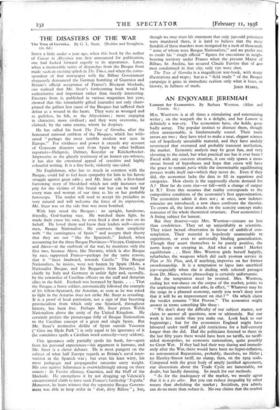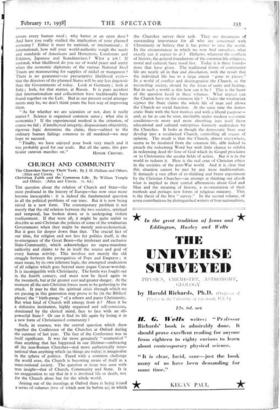AN ENJOYABLE JEREMIAH
Lament for Economics. By Barbara Wootton. (Allen and Unwin. 6s.) Mts. WoorroN is at all times a stimulating and entertaining writer ; on the warpath she is a delight, and her Lament is definitely a war-cry. The economists have, she holds, gone badly astray. The popular instinct to distrust them, though often unreasonable, is fundamentally sound. Their main errors are two ; they have tried to make a neat, elegant science out of hopelessly unsuitable material, and they have unduly reverenced that overrated and probably transient institution, the market. Economic analysis may be great fun, and very elevating to the mind, but what practical use has it ever been ? Faced with any concrete situation, it can only spawn a mon- strous brood of hypotheses and hope that cetera will have the grace to remain paria while the interminable equilibrating process works itself out—which they never do. Even if they did, the economist lacks the data to fill in equations and categories. How elastic is the supposedly elastic demand for A ? How far do costs rise—or fall—with a change of output in X ? Even this assumes that reality corresponds to the competitive conditions of the economist's first approximation. The economists admit it does not ; at once, new indeter- minacies are introduced, a new chaos confronts the theorist. To crown all, the latest attacks on the scarcity concept make nonsense of the whole theoretical structure. Poor economists ! A fitting subject for lament.
But they deserve—says Mrs. Wootton—censure no less than condolence. They set up unjustifiably as scientists. They reject factual observation in favour of umbilical con- templation. Their material is hopelessly unamenable to experiment, or even to universally binding generalisation. Though they assert themselves to be purely positive, the norm keeps on creeping in. And what a norm ! Market equilibrium . . . Here Mrs. Wootton girds herself happily, refurbishes the weapons which did such yeoman service in Plan or No Plan, and, if anything, improves on her former swordsmanship. It is a temptation to lapse into uncritical joy—especially when she is dealing with selected passages from Dr. Mises, whose phraseology is certainly unfortunate.
But the temptation must be resisted. Mrs. , Wootton, ending her war-dance on the corpse of the market, points to the unpleasing remains and asks, in effect, " Whatever may be the snags in a planned economy, surely you won't deny now that it will be an improvement on that?" On which claim the verdict remains " Not Proven." The economist might answer in terms something like these :
" We don't deny the difficulty of our subject matter, nor claim to answer all questions, now or ultimately. But our work is less sterile than you make out. Look back to our beginnings ; but for the economists England might have laboured under tariff and gild restrictions for a half-century longer than she did. Had the politicians listened to them in the last fifty years there would have been no tariffs, no tariff- aided monopolies, no economic nationalism, quite possibly no Great War. If they had had their way during and immedi- ately after the War, there would have been no hyper-inflation, no astronomical Reparations, probably, therefore, no Hitler ; no Hawley-Smoot tariff, no slump, then, on the 1929 scale. Compared with the great body of amply justified agreement, our dissensions about the Trade Cycle are lamentable, no doubt, but hardly damning. So much for our methods.
" As for the inadequacy of the market, we mostly agree that it is a pis alter. But you can reduce inequality by other means than abolishing the market ; Socialism, you admit, can do no more than reduce it. No one claims that the market
covers every human need ; why batter at an open door ? And have you really studied the implication of your planned economy ? Either it must be- national, or international ; if international, how will your world-authority weigh the needs and standards of Americans and Hottentots, Londoners and Eskimos, Japanese and Scandinavians ? What a job ! If national, what likelihood do you see of world peace and amity when the economic diplomats of the various National Steel Trusts are manoeuvring for supplies of nickel or manganese ? There is no guarantee—no presumptive likelihood even— that the directors of the planned States will be any less jingoistic than the Governments of today. Look at Germany ; look at Italy ; look, for that matter, at Russia. It is pure accident that internationalism and collectivism have traditionally been found together on the Left. Bad as our present social arrange- ments may be, we don't think yours the best way of improving them.
" As for whether we are scientists or not, does it really matter ? Science is organised common sense ; what else is economics ? If the experimental method is the criterion, of course we fail ; if intellectual integrity, dispassionate objectivity, rigorous logic determine the claim, then—subject to the ordinary human failings common to all mankind—we may hope to succeed.
" Finally, we have enjoyed your book very much and it was probably good for our souls. But all the same, this par-



















































 Previous page
Previous page